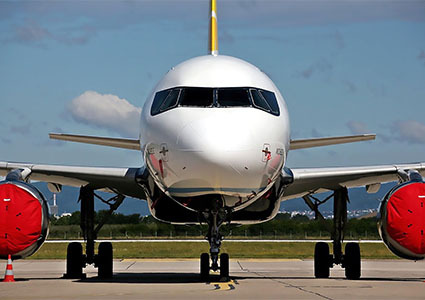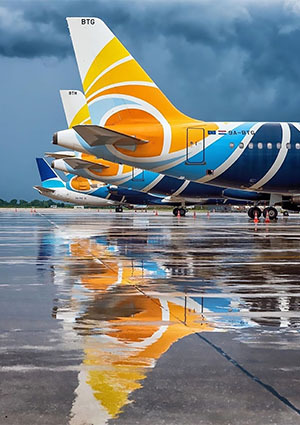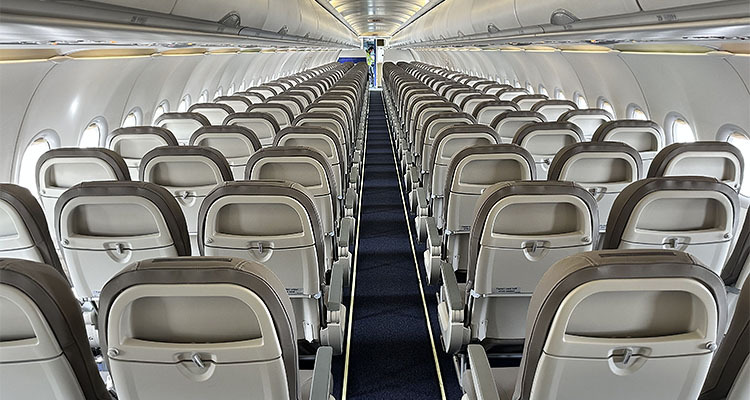Learn how Trade Air ingeniously doubled its fleet amidst global turbulence
Established in 1994, Trade Air Ltd stands as one of Europe’s most successful charter carriers. From its headquarters in Zagreb, Croatia, Trade Air offers premium passenger and cargo transport services, tailored to each client’s preferences and requirements. Broadly recognized as a trusted entity in Europe and throughout the world, the company strives to maintain high standards of service. Trade Air’s continuous efforts have been rewarded by numerous prestigious programs, such as the IATA Operational Safety Audit for which it has already held certification for a decade as well as the best mid-sized company in Croatia in the year 2018 by Croatian Chamber of Commerce. Marko Cvijin, Managing Director, sums up what Trade Air has been up to over the last couple of years.
“Currently, our fleet boasts five Airbus A320s and one Airbus A319. In a bold move, we decided to step up our game during the pandemic by doubling our fleet, seizing favorable financing rates. Since securing the aircraft and financing were relatively straightforward tasks, we subsequently acquired one aircraft each year from 2020-to-2022. For a small company like ours, this represents a significant achievement. Moreover, we have significantly expanded our presence across Europe, operating charter flights for tour operators from Kosovo, Slovenia, Italy and beyond. Additionally, we offer aircraft, crew, maintenance and insurance (ACMI) services to over 60 airlines in Europe, the Middle East and even Africa. In 2024, Trade Air operates one aircraft in Montenegro, another serves Croatia Airlines, and one flies out of Bergamo in Italy on behalf of a Maltese carrier. Eight years ago, we secured a contract with the Government of Croatia to fly on public service obligation (PSO) routes. As part of this, Trade Air uses a small 30 seat turboprop, leased from a Polish operator, to connect airports within Croatia only. Based in the northeastern part of Croatia, the aircraft connects cities along the coast. Though a small portion of our business, tickets for these flights are readily available for purchase on our website,” he begins.
seizing favorable financing rates. Since securing the aircraft and financing were relatively straightforward tasks, we subsequently acquired one aircraft each year from 2020-to-2022. For a small company like ours, this represents a significant achievement. Moreover, we have significantly expanded our presence across Europe, operating charter flights for tour operators from Kosovo, Slovenia, Italy and beyond. Additionally, we offer aircraft, crew, maintenance and insurance (ACMI) services to over 60 airlines in Europe, the Middle East and even Africa. In 2024, Trade Air operates one aircraft in Montenegro, another serves Croatia Airlines, and one flies out of Bergamo in Italy on behalf of a Maltese carrier. Eight years ago, we secured a contract with the Government of Croatia to fly on public service obligation (PSO) routes. As part of this, Trade Air uses a small 30 seat turboprop, leased from a Polish operator, to connect airports within Croatia only. Based in the northeastern part of Croatia, the aircraft connects cities along the coast. Though a small portion of our business, tickets for these flights are readily available for purchase on our website,” he begins.
Strategy for success
While the transport industry was heavily impacted by the pandemic, Trade Air was able to strategize to double its fleet. Marko discusses the factors prompting this significant investment. “Over half of the aircraft in the world are typically purchased new by financial institutions (lessors), then leased to globally renowned airlines such as Lufthansa and British Airways, among others. Trade Air had the innovative idea to buy aircraft directly from the provider, thus bypassing these institutions and retaining full ownership of the airplanes. Upon selecting our aircraft, namely Airbus A320s, we insisted on a finance lease which ensured Trade Air’s full ownership of the airplane after the lease term. Benefiting from low interest rates, we also negotiated the purchase price – which was already drastically reduced. This investment was motivated by my determination to ensure the sustainability of our business model throughout the challenging year of 2020. Since then, the market has rebounded and was back in its full glory by 2023,” he informs.
 On a similar note, Marko reveals that another important industry event resulted in even more success for Trade Air’s ACMI services. “In July 2023, Pratt and Whitney Ltd announced a major issue with its new geared turbofan (GTF) engine, as featured in Airbus A320neo and A321neo models. Indeed, over time, cracks developed in the engine structure. To address this, the FAA required all 3000 GTF engines – installed on 1500 aircraft – to undergo servicing and extensive maintenance checks. Since fixing the engines can take the best part of a year, aircraft availability on the market is expected to remain limited for the remainder of this year and into 2025. As this issue continues to affect the industry on a global scale, companies like Trade Air, operating Airbus models equipped with classic CFM International engines, are now experiencing increased demand. Thus, we anticipate further growth through 2025 and even 2026,” he unveils.
On a similar note, Marko reveals that another important industry event resulted in even more success for Trade Air’s ACMI services. “In July 2023, Pratt and Whitney Ltd announced a major issue with its new geared turbofan (GTF) engine, as featured in Airbus A320neo and A321neo models. Indeed, over time, cracks developed in the engine structure. To address this, the FAA required all 3000 GTF engines – installed on 1500 aircraft – to undergo servicing and extensive maintenance checks. Since fixing the engines can take the best part of a year, aircraft availability on the market is expected to remain limited for the remainder of this year and into 2025. As this issue continues to affect the industry on a global scale, companies like Trade Air, operating Airbus models equipped with classic CFM International engines, are now experiencing increased demand. Thus, we anticipate further growth through 2025 and even 2026,” he unveils.
With serious geopolitical issues affecting trade and people worldwide, Trade Air’s operations in the Middle East have been put on hold. “Trade Air is quite fortunate to rely on a mobile operational model, unlike major carriers which fly from fixed hubs. In other words, we can move our base to capitalize on job opportunities anywhere. Amid the ongoing crisis in the Middle East, we have halted our operation in Israel, exploring new ventures in other places instead. I believe losing that contract was regrettable as we enjoyed working in Israel due to the significant demand for extra capacity there. However, once the situation stabilizes, Trade Air will be looking forward to renewing that contract,” he says.
Agile and adaptable
As our interview reaches its end, Marko lays out Trade Air’s strategy for the future. “With all our aircraft capacity sold out since October 2023, I believe we are in a very strong position for the rest of the year. We do not typically exhaust our capacity so early, but because of the widespread lack of capacity, our clients started negotiating in advance. For instance, there is hardly any narrowbody capacity to rent on a semi lease for the summer, and the ones that are available are extremely costly. Looking at our long-term strategy, our five-year plan entails expanding our fleet with a couple more units. Nonetheless, the market’s instability, driven by the current geopolitical issues, makes it difficult to plan beyond a year. Additionally, we are amid an economic slowdown, possibly on the verge of a recession, so my long-term forecasts might not be accurate. Still, I believe that for the time being, we should prioritize revenue growth and scale back investments until geopolitical situations stabilize,” he concludes.
Having capitalized on difficult market conditions, Trade Air proves it is ready to tackle new challenges proactively. As a result, the company is well-equipped to achieve further success through its highly flexible and mobile business model, all while remaining adaptable in the face of volatile geopolitical and economic climates.
